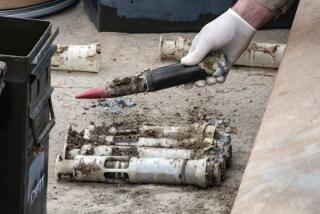Unexplained Leaps
- Share via
When British Prime Minister Tony Blair visits Washington, he shouldn’t hope for respite from the pounding he’s taken over failures to discover weapons of mass destruction in Iraq. The U.S. media may be more polite than British tabloidists, but will no doubt grill Blair about British intelligence sources blamed for President Bush’s errant claim in his Jan. 28 State of the Union speech that Iraq was trying to buy enriched uranium from Niger.
White House Press Secretary Ari Fleischer disputes that the administration went to war on the basis of the British claims as “a bunch of bull,” while national security advisor Condoleezza Rice uses the word “ludicrous.” Fleischer and Rice have a point about the uranium claim’s being a small part of the big picture, but not the one they think.
Other statements about Iraq’s weapons of mass destruction program should not be buried in the Niger flap. Many of those claims, although not quite as clear-cut, appear to have been exaggerated. They raise broader questions about the competence of the CIA and about the pressures exerted on the agency.
The most sweeping assessment of Iraqi leader Saddam Hussein’s intentions was contained in October’s CIA report “Iraq’s Weapons of Mass Destruction.” In it, the CIA made a number of allegations about Iraq’s nuclear, chemical, biological and ballistic missile programs. The key judgments:
* If left unchecked, Baghdad would probably have a nuclear weapon this decade. If it got enough “fissile material,” i.e. uranium, it could build a bomb “within a year.”
* Baghdad had begun renewed production of chemical warfare agents, including mustard, sarin and VX gases.
* Every aspect of Hussein’s biological weapons programs was “active and most elements are larger and more advanced than they were before the Gulf War.”
* Baghdad was developing missiles capable of delivering weapons payloads, including biological agents, to other nations.
Today, on its Web site, the best the agency can muster is a few pictures of suspected mobile weapons labs. Given this paucity, the jump in the level of CIA alarm from 2001 to 2002 is puzzling. In 2001’s report, the CIA told Congress: “We believe that Iraq has probably continued at least low-level theoretical [research and development] associated with its nuclear program.” The 2001 report also said “we are concerned that Iraq may again be producing [biological weapons] agents.” Last year, the assertion of such a program was categorical.
The CIA was right to be concerned about Iraq’s intentions, but in 2001 it was not describing an imminent threat to U.S. security. It is far from clear that Congress or ordinary Americans, not to mention the British government, would have supported war to oust a nasty dictator. That is the administration’s real problem.
More to Read
Sign up for Essential California
The most important California stories and recommendations in your inbox every morning.
You may occasionally receive promotional content from the Los Angeles Times.










